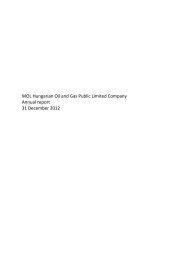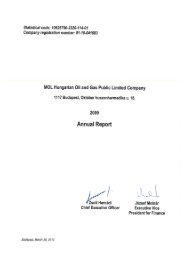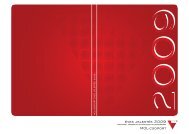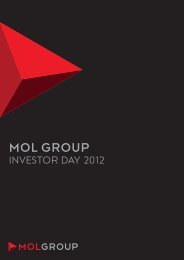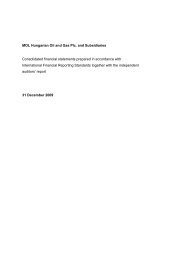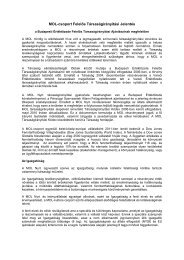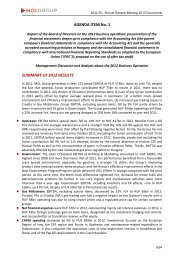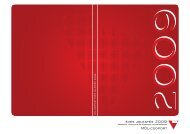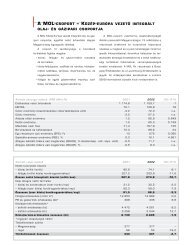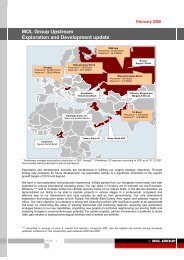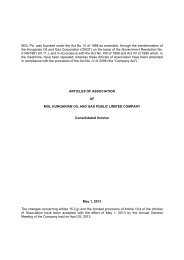appear in the Yearbook. <strong>MOL</strong> Group received the Bronze qualification in the last year, as well as being selected as the best“Sector Mover”. All the good work performed last year enabled the company to enter the SAM Gold Class category. Toqualify for the SAM Gold Class, the SAM Sector Leader must achieve a minimum total score of 75%. Peer group companieswhose total scores are within 5% of the SAM Sector Leader also enter the SAM Gold Class. This year out of 113 global oilcompanies, 68 were examined in detail with 17 being selected to appear in the Yearbook of which 8 entered the GoldenClass category. According to SAM’s assessment, the Corporate Governance practice of <strong>MOL</strong> is outstanding, and its resultis above the industry average. The evaluation criteria consisted several topics, e.g. board structure, corporate governancepolicies or transparency.Board of Directors<strong>MOL</strong>’s Board of Directors acts as the highest managing body of the Company and as such has collective responsibility for allcorporate operations. The Board’s key activities are focused on achieving increasing shareholder value with considerationsonto other stakeholders’ interest; improving efficiency and profitability and ensuring transparency in corporate activitiesand sustainable operation. It also aims to ensure appropriate risk management, environmental protection and conditions forsafety at work.Given that <strong>MOL</strong> and its subsidiaries effectively operate as a single unit, the Board is also responsible for enforcing its aimsand policies and for promoting the <strong>MOL</strong> culture throughout the entire Group.Corporate Governance<strong>MOL</strong> has always been committed to implementing the highest standards of corporate governance structures and practices.This is not only with regard to national expectations but also with reference to the continually evolving and improvingstandards of good governance on an international level. As a result <strong>MOL</strong> is geared towards shareholders’ interests, whilsttaking into account the interests of a broader group of stakeholders inevitably necessary to enhance the generation ofexceptional value for <strong>MOL</strong>’s shareholders and people.Among other things, the voluntary approval of the declaration on the Budapest Stock Exchange Corporate GovernanceRecommendations by the <strong>Annual</strong> General Meeting in 2006, before the official deadline, served as testament to theCompany’s commitment to corporate governance. In addition, <strong>MOL</strong> made a declaration concerning the application of thecorporate governance recommendations of the Warsaw Stock Exchange prior to the admission of its shares to the WarsawStock Exchange in December 2004. The Company submits its declaration on this topic to both stock exchanges each year.<strong>MOL</strong>’s corporate governance practice meets the requirements of the regulations of the Budapest Stock Exchange, therecommendations of the Hungarian Financial Supervisory Authority and the relevant regulations of the Capital Market Act. <strong>MOL</strong>also subjects its policies to regular review to ensure that they take account of continually evolving international best practice inthis area. <strong>MOL</strong>’s Corporate Governance Code containing the main corporate governance principles of the Company has beenadopted in 2006 and has been updated in 2010. This Code summarises its approach to shareholders’ rights, main governing bodies,remuneration and ethical issues. The Corporate Governance Code has been published on the homepage of the Company.In 2011, <strong>MOL</strong> Group, the only Central & East European company to be in the running, has qualified for the SAM GoldClass based on its performance in the field of corporate sustainability. This was announced in The Sustainability Yearbookedited by SAM (Sustainable Asset Management) which conducts the performance research and analysis for the DowJones Sustainable Index. The 2,500 largest global companies, based on the Dow Jones Stock Market Index, are invited toundergo the research. The independent assessors examine the three dimensions of sustainability: long-term economic,social and environmental performance. Accordingly, the top 15% of companies from 58 business sectors are selected toThe principles, policies and goals take account of the Board’s specific and unique relationship with <strong>MOL</strong>’s shareholders, theexecutive management and the Company. The composition of the Board reflects this with the majority (eight of elevenmembers) made up of non-executive directors*. At present, 8 members of the Board of Directors qualify as independent onthe basis of its own set of criteria (based on NYSE and EU recommendations) and the declaration of directors.The members of the Board of Directors and their independence status (professional CVs of the members are available oncorporate homepage):Zsolt Hernádi, Chairman-CEOnon-independentDr. Sándor Csányi, Vice ChairmanindependentMulham Al-JarfindependentDr. Miklós DobákindependentDr. Gábor HorváthindependentZsigmond Járai*independentJózsef Molnárnon-independentGyörgy Mosonyinon-independentDr. László Parragh*independentIain PatersonindependentDr. Martin Roman*independent*Before Zsigmond Járai, Dr. László Parragh and Dr. Martin Roman, until 29 April 2010 László Akar, Miklós Kamarás and Dr. Ernő Kemeneswere the members of the Board of Directors.Operation of the Board of DirectorsThe Board acts and makes resolutions as a collective body.The Board adopted a set of rules (Charter) to govern its own activities when the company was founded in 1991; these ruleswere updated in October, 2010 to ensure continued adherence to best practice standards.The Board Charter covers:– scope of the authority and responsibilities of the Board,– scope of the committees operated by the Board,– the scope of the information required by the Board and the frequency of reports,– main responsibilities of the Chairman and the Vice Chairman,– order and preparation of Board meetings and the permanent items of the agenda, and– decision-making mechanism and the manner in which the implementation of resolutions is monitored.Members of the Board have signed a declaration on conflict of interest and they have reported their position as director inthe Board to their employer or principal as regards other key management positions.Corporate Governance214 <strong>MOL</strong> Group annual report 2010 215
The Board of Directors prepares a formal evaluation of its own performance (the Committees evaluate their performance aswell) and it reviews continuously its activity on a yearly basis.<strong>Report</strong> of the Board of Directors on its 2010 activitiesIn 2010, the Board of Directors held 6 meetings with an average attendance rate of 86%. Alongside regular agenda items, such as reportsby the Committees’ chairmen on the activities pursued since the last Board meeting, update on key strategic issues or an overview ofcapital market developments, the Board of Directors also individually evaluates the performance of each of the company’s business units.The Board of Directors respectively paid highlighted attention to the treatment of the significantly changed external environment,the financial, operation and efficiency improvement challenges regarding INA consolidation and the strategy update process. <strong>MOL</strong>continuously adjusts its operation to the external environment and became more international, more efficient and more upstreamdriven in the recent years. <strong>MOL</strong> not just remained committed to keep its financial stability but continued the key developmentprojects, hereby established an outstanding position for the upturn period in each business division.The Company’s key task for the coming years is to maximize the value of its extended portfolio by harmonizing the operationand exploiting the synergies.Committees of the Board of DirectorsThe Board operates committees to increase the efficiency of the Board’s operations, and to provide the appropriate professional backgroundfor decision making. These Committees have the right to approve preliminary resolutions concerning issues specified in the Decisionmakingand Authorities List, which sets out the division of authority and responsibility between the Board and the executive management.Responsibilities:– review of financial and related reports,– monitoring the efficiency of the internal audit system,– review of planning, scope and results of the audit,– oversight of the risk management,– monitoring the liquidity position of the Company, the financial and operational risks as well as the methodologyand strategy of management thereof, review the operation of Enterprise Risk Management (ERM) system,– ensuring the independence and objectivity of the external auditor.Sustainable Development Committee:Members and dates of appointment (professional backgrounds of members are available on company homepage):– György Mosonyi – Chairman, 29 June 2006– Dr. László Parragh, 29 April 2010*– Iain Paterson, 29 June 2006* Before Dr. László Parragh until 29 April 2010 Dr. Ernő Kemenes was the member of the Sustainable Development Committee.Responsibilities:– control of the operation under long-term economic, environmental and social aspects,– evaluation of objectives and results regarding sustainable development,– supervision of the non-financial (sustainability) chapter and the audit process of the annual report,– accountability for sustainability performance of business divisions and subsidiaries.– The responsibilities of the Committees are determined by the Board of Directors.– The Chairman of the Board of Directors may also request the Committees to perform certain tasks.The members and chairs of the Committees are elected by the Board of Directors. The majority of the committee membersis non-executive and independent.The Board allocates responsibilities to the various Committees as follows:Corporate Governance and Remuneration Committee:Members and dates of appointment (professional backgrounds of members are available on company homepage):– Dr. Sándor Csányi – Chairman, 17 November 2000– Zsolt Hernádi, 8 September 2000– Dr. Gábor Horváth, 8 September 2000– Dr. Martin Roman, 29 April 2010 *– Mulham Al-Jarf, 23 April 2008* Before Dr. Martin Roman until 29 April 2010 Miklós Kamarás was the member of the Corporate Governance and Remuneration Committee.Responsibilities:– analysis and evaluation of the activities of the Board of Directors,– issues related to Board membership,– promoting the relationship between shareholders and the Board,– procedural, regulatory and ethical issues,– reviewing corporate processes, procedures, organisational solutions and compensation and incentive systemsand making recommendations on the introduction of best practice standards.<strong>Report</strong> of the Corporate Governance and Remuneration Committee on its 2010 activitiesIn 2010, the Corporate Governance and Remuneration Committee held 6 meetings with a 85% average attendance rate.In addition to the issues of corporate governance, remuneration and the composition of the management, the Committeediscussed a number of key strategic and results-related topics prior to their presentation to the Board of Directors for discussion.<strong>Report</strong> of the Finance and Risk Management Committee on its 2010 activitiesIn 2010, the Finance and Risk Management Committee held 5 meetings with a 100% average attendance rate. In addition tothe regular items on the agenda, including the audit of all public financial reports, providing assistance with the auditor’s workand the regular monitoring of internal audit, the Committee reviewed the major risk factors of the Company, considering thechanged international financial position and the status reports on risk management actions attached to these factors. TheCommittee provides for duties of Slovnaft a.s Audit Committee.<strong>Report</strong> of the Sustainable Development Committee on its 2010 activitiesIn 2010, the Sustainable Development Committee held 4 meetings with a 100% attendance rate. The Committee evaluatedthe accomplishment of the actions in 2010, formed opinion on sustainability reporting and decided on 2011 directions andtargets. The Committee considered with highlighted attention the results of the assessment related to the Dow JonesSustainability indexes and the sustainability performance reports of business units.Relationship between the Board and the Executive ManagementThe governance of the Company is carried out in line with standardised corporate governance principles and practice, and,within its framework, the Board of Directors will meet its liabilities for the integrated corporate governance by defining theresponsibilities and accountabilities of the Executive Board, established by the Board and securing the corporate operativeactivities, operating and organisational procedures, as well as standardised system for target-setting, reporting and audit(performance control system and business control system).Corporate GovernanceFinance and Risk Management Committee:Members and dates of appointment (professional backgrounds of members are available on company homepage):– Dr. Miklós Dobák – Chairman, 25 October 2002– Zsigmond Járai, 29 April 2010 *– Iain Paterson, 8 September 2000A consistent document prescribes the distribution of decision-making authorities between the Board of Directors and thecompany’s organisations, defining the key control points required for efficiently developing and operating <strong>MOL</strong> Group processes.Control and management of <strong>MOL</strong> Group will be implemented through business and functional organisations. The ExecutiveBoard (hereinafter “EB”) will be responsible for harmonising their activities.* Before Zsigmond Járai until 29 April 2010 Dr. Ernő Kemenes and László Akar were the members of the Finance and Risk Management Committee.The EB is a forum for decision preparation and its role is to provide a direct link between the Board of Directors and theCompany’s staff and at the same time canalize the matters submitted to the full Board. The EB renders preliminary opinions216 <strong>MOL</strong> Group annual report 2010 217



